Onions : store them in the fridge and don*t "hover" over the cutting board when chopping = no tears! And use red onions instead of yellow, less bitterness
Burnt pan : water and dishwasher powder in the pan for a couple of hours or over night works better.
We Busted 10 Kitchen Myths That Our Mothers Often Swore By
Our grannies and mothers saved all kinds of useful kitchen tips over the years and passed them on to the next generation. But in the era of the Internet, such life hacks become more and more popular, which makes it increasingly difficult to figure out which hacks are good and bad. Are all these kitchen myths really as good and effective as they’re said to be?
Myth № 1: To make dough thicker, you need to mix soda with vinegar.
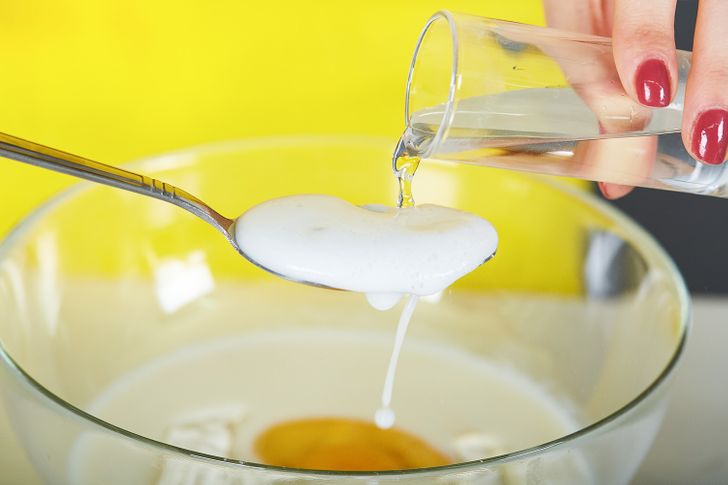
To debunk this myth, we didn’t actually bake any buns, but rather, we remembered our lessons from chemistry class. So, in order for soda to be used as a baking powder, it needs an acidic environment. But it was common practice in the ’60s for housewives to mix the soda with vinegar (apparently, it was at hand most often). As a result of the reaction, carbon dioxide would be released, adding a little puff to the dough. However, the problem with this is that carbon dioxide would escape before getting to the dough.
Ideally, you need to mix soda with dry ingredients and acid, then with liquid, and quickly mix both parts and bake. However, in this method, it’s better not to use vinegar, but instead, use sour cream, buttermilk, or lemon juice as an acid instead — or simply buy a bag of baking powder. We think this method is better left in the past.
Conclusion: It does not work.
Myth № 2: To make eggs easy to shell, you need to put them into cold water after cooking.
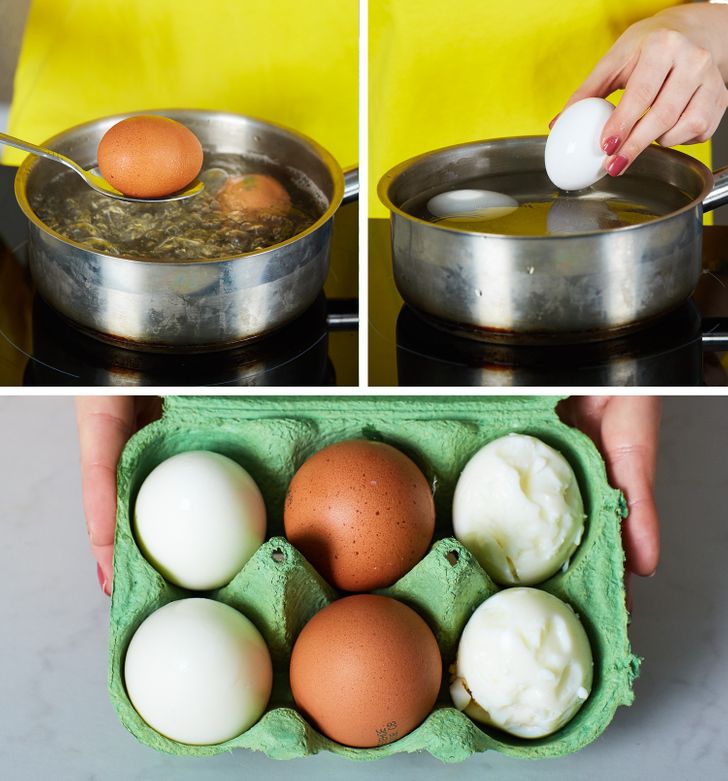
Hard-boiling eggs perfectly so that the shell can be easily removed is a form of art. Just immersing eggs in cold water is clearly not enough.
Chef Kenji Lopez-Alt has cooked thousands of eggs over the past few years to find the perfect cooking technology. He advises dropping eggs into boiling water — and not cold, despite what everyone is used to. We did this ourselves! The eggs were really cleaned better when they were brewed in boiling water. However, you must be attentive because at different temperatures, eggs can simply crack.
Here are a few more secrets:
- The fresher the egg, the harder it is to peel off the shell.
- Ready eggs should be placed in ice cold water for at least 15 minutes, and then cleaned under cold running water.
- To make sure eggs are 100% not going to crack, try cooking them in couples. Kenji claims that this is the perfect way of cooking them.
Conclusion: It works, but only if all the other rules are followed.
Myth № 3: To make a dirty pan easy to clean, you need to boil saline solution in it.
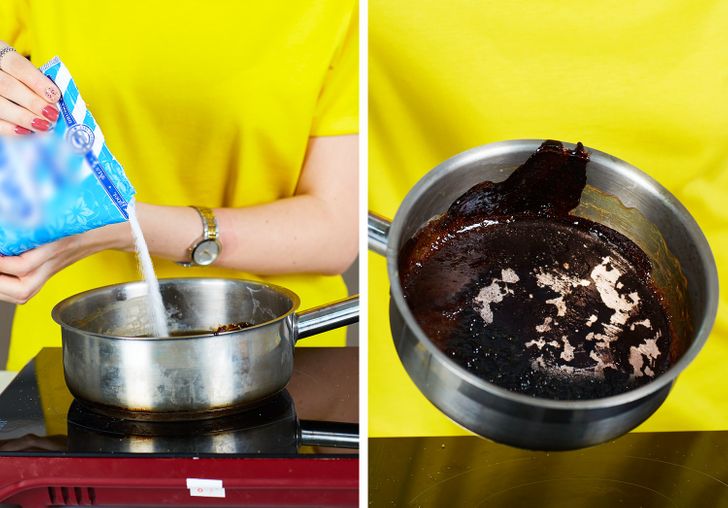
Old cookbooks advise housewives to clean a burnt pan in the following way: add some water, a lot of salt and boil it all together. Alas, this advice did not ease the unfortunate fate of our poor saucepan: the dirt remained exactly as it was. In addition, such a caustic slurry of salt can be harmful to stainless steel.
There turned out to be a much more effective and easy way to clean a dirty pan: soak it in warm water, leave it that way overnight, and in the morning it will be much easier to clean, no matter how messy it was.
Conclusion: does not work.
Myth № 4: To keep your hands and dishes from smelling like fish, you need to rinse them with cold water, and then wipe them with vinegar or lemon.
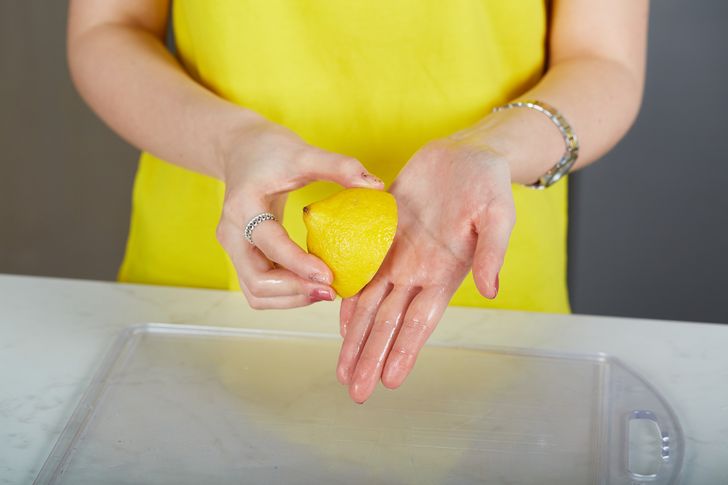
It is difficult to get rid of the smell of fish, and even detergents do not always help. The good old advice works best here: rinse the surface with running water and then wipe them with lemon juice. A weak solution of vinegar also helps to solve this problem.
Conclusion: it works.
Myth № 5: To prevent cheese from getting stale, you need to store it in parchment paper instead of plastic wrap.
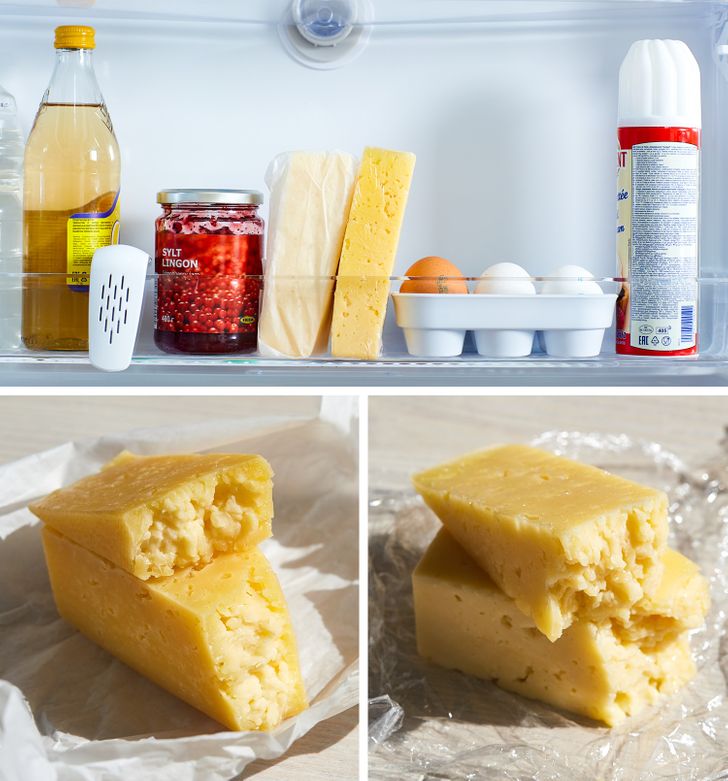
When sold, cheese is usually wrapped in plastic, and many store it in it as well. But they say that parchment paper is much better suited for storing food items, including cheese.
One piece of cheese we packed with plastic wrap and the other, with parchment paper; and then left them in the refrigerator for three days. The result surprised us: The cheese that we wrapped in the paper was very dry and became stale while the one in plastic wrap, on the other hand, remained unharmed.
Perhaps the best advice would be to eat cheese as soon as possible before it starts to deteriorate.
Conclusion: does not work.
Myth № 6: To cut onions without crying, you need to dip the knife in cold water.
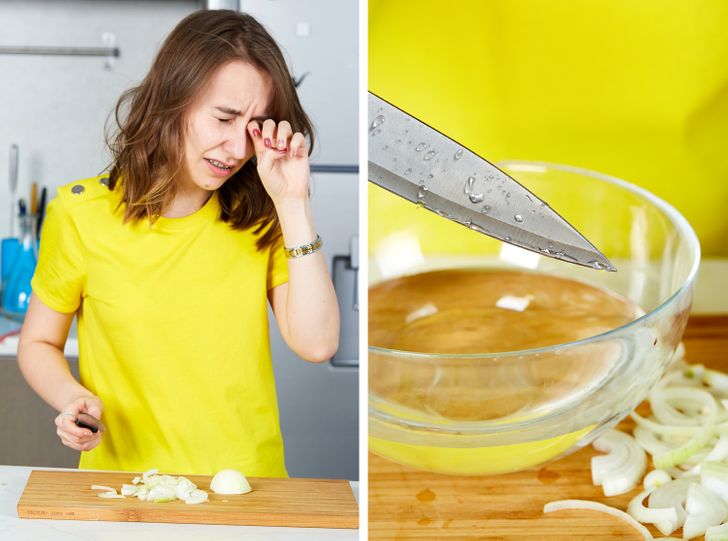
We tend to have a lot of trouble cooking with onions: either they fall apart when we try to cut them, or they make us cry our eyes out. It is advised to cut onions with a wet knife, wetting it from time to time while chopping them.
This advice generally works, but it all depends on the “stinging” of the onion and the sensitivity of your eyes. We still had a hard time trying not to cry, despite all the measures being taken. Additionally, dunking your knife in water every minute is not particularly convenient.
Conclusion: it generally works.
Myth № 7: To make potatoes easy to peel after cooking, they should be left for a couple of minutes in ice cold water.
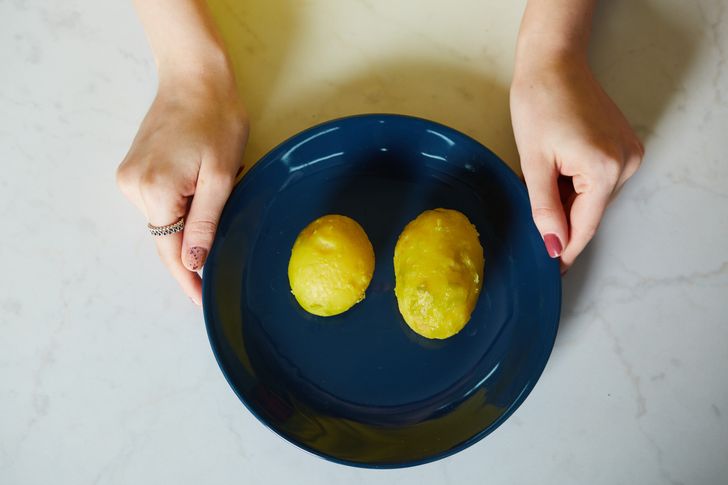
When potatoes are boiled and drained of excess water, we usually give them some time to cool down and only then, proceed to peel them. But this is no fun: the peel doesn’t want to come off and is always sticking to your fingers!
In order to facilitate the procedure, you can follow this technique: Boil potatoes and then dip them in ice cold water for a couple of minutes before cleaning them. And it works fine — the potatoes cool down properly, and thanks to the moisture, the peel is cleaned without any problems. However, there are a few “buts” here: the vegetables become a bit watery and don’t cook as well this way. Although, we did not notice a big difference either in appearance or in taste. Perhaps we just don’t know how to cook?
Conclusion: it works.
Myth № 8: To quickly cool a hot drink, you need to place it in a basin containing ice sprinkled with salt.
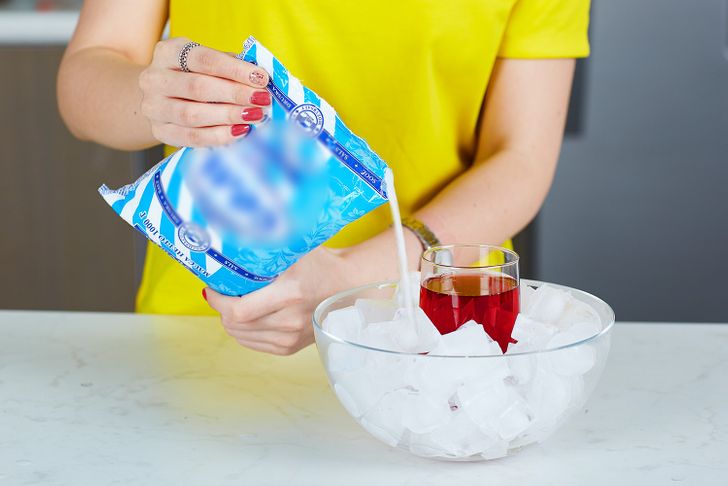
Simple physics work here: when salt is added, the ice melts, but its temperature decreases. This mixture is capable of cooling a hot drink in a matter of minutes — our compote almost turned into ice in about five minutes.
Conclusion: it works.
Myth № 9: To keep onions from tasting bitter, pour hot water over them.

Very few people can enjoy the bitter taste of onions in dishes. However, they can be “defused” by following a simple process. After you have chopped the onions, place them in a small bowl and pour boiling water in it. Leave for one to two minutes, then drain. Onions don’t actually taste bitter at all after this — we checked.
Conclusion: it works.
Some tips for cutting onions:
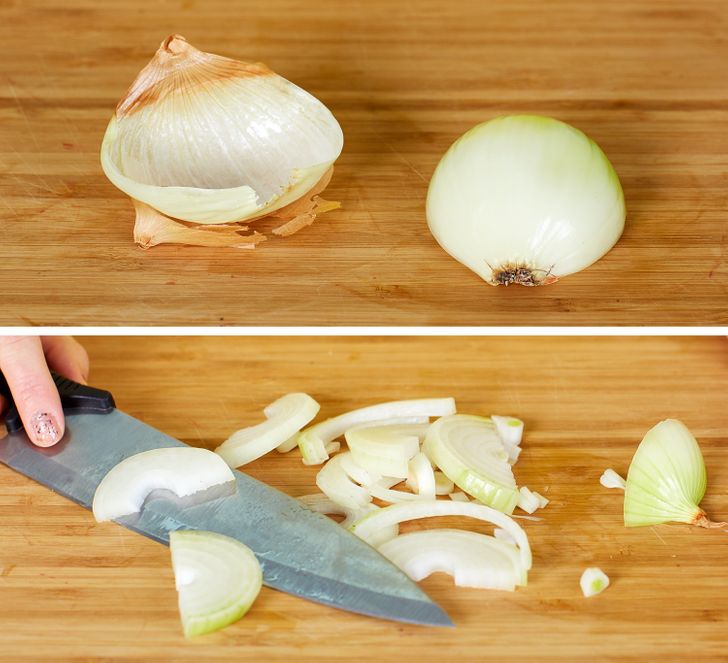
- Sometimes the peel holds on tightly to the onion. In order not to mess around and not have to remove it with a knife, just remove the top layer together with the peel. We tried it, and it really works.
- Do not cut the “tail” of the onion: it is very convenient for holding it while cutting. You can just throw it away afterward.
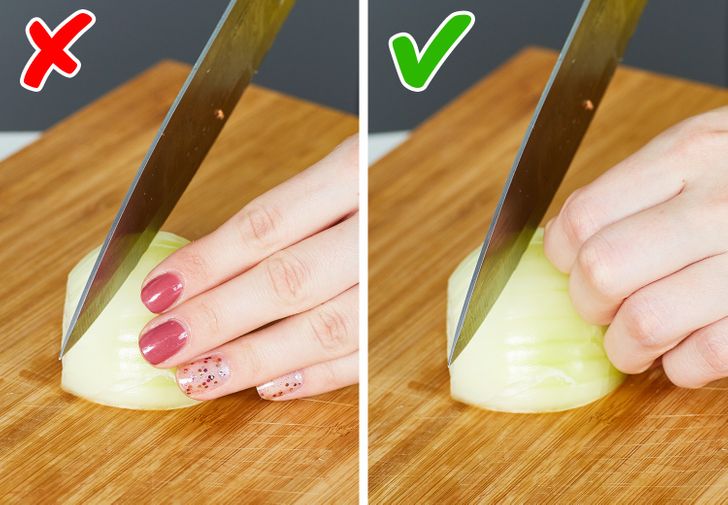
- If you don’t want to cut off your fingers, you should never hold the bulb as shown in the picture on the left — the risk of cutting yourself is too high. Bend your fingers and hold the bulb firmly so you will save your hands and learn how to shred like a real boss.
Myth № 10: To prevent avocados from getting darkened, you need to store it together with a slice of onion.
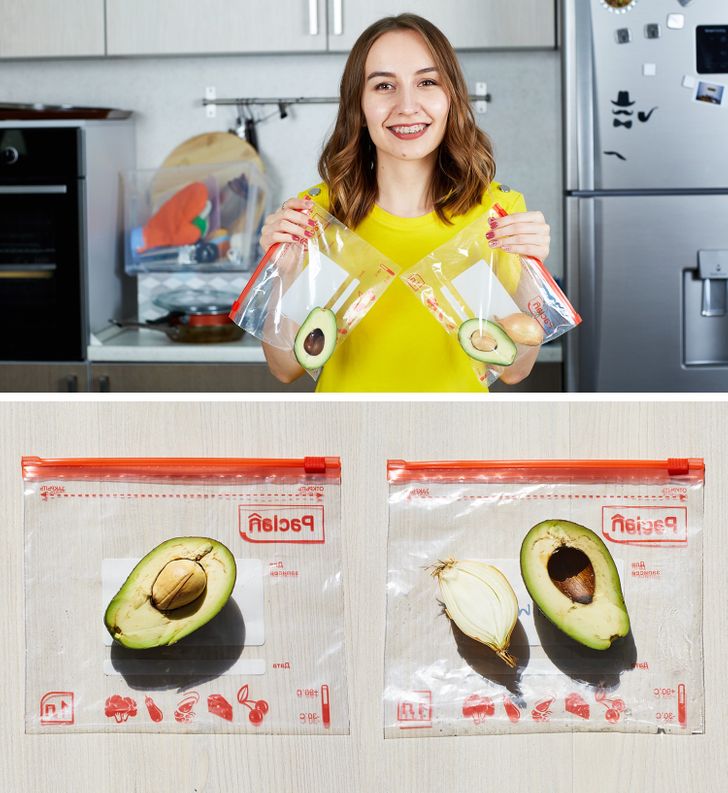
We could not ignore this advice, our love for avocados here at Bright Side is too strong! Many people know that if you leave avocado halves in the refrigerator for at least a day, they quickly begin to darken. To avoid this, some housewives advise storing the avocado alongside a slice of onion.
We tested this simple method and here’s what we discovered after three days: the onion did not help the fruit retain its appearance. In addition, the avocado adopted a light onion smell, which probably won’t make anyone happy. Most likely, the avocado did not darken due to the tightly sealed package, and this is the method of storage we strongly recommend.
Conclusion: does not work.
Comments
Related Reads
15+ Times a Solution to a Problem Was So Simple We’re Surprised We Missed It

10+ People Who Experienced a Real-Life Horror Movie

15+ People Who Dared to Leave Their Corporate Job Behind and Start a New Life

My Mother-in-Law Stole My Jewelry Collection, So I Divorced Her Son
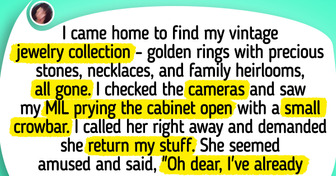
Helen Hunt, 60, Stuns During Her Latest Appearance, and Her Lips Become the Center of Attention

15 Awkward Situations That Could Happen to Any Parent

"Transformed Into Someone Else," Fans Can’t Recognize Nicole Kidman in Her Newest Appearance

12 Parents Who Turned Family Life Into a Bestseller Drama

Zac Efron’s Appearance a Few Days Ago Leaves Fans Shocked and Worried

I Told My MIL She’s Not Allowed to Babysit My Child Anymore

I Refuse to Pay for My Stepson’s Private School—I’m Not a Cash Cow

12 Disturbing Events That Crushed People’s Spirits
